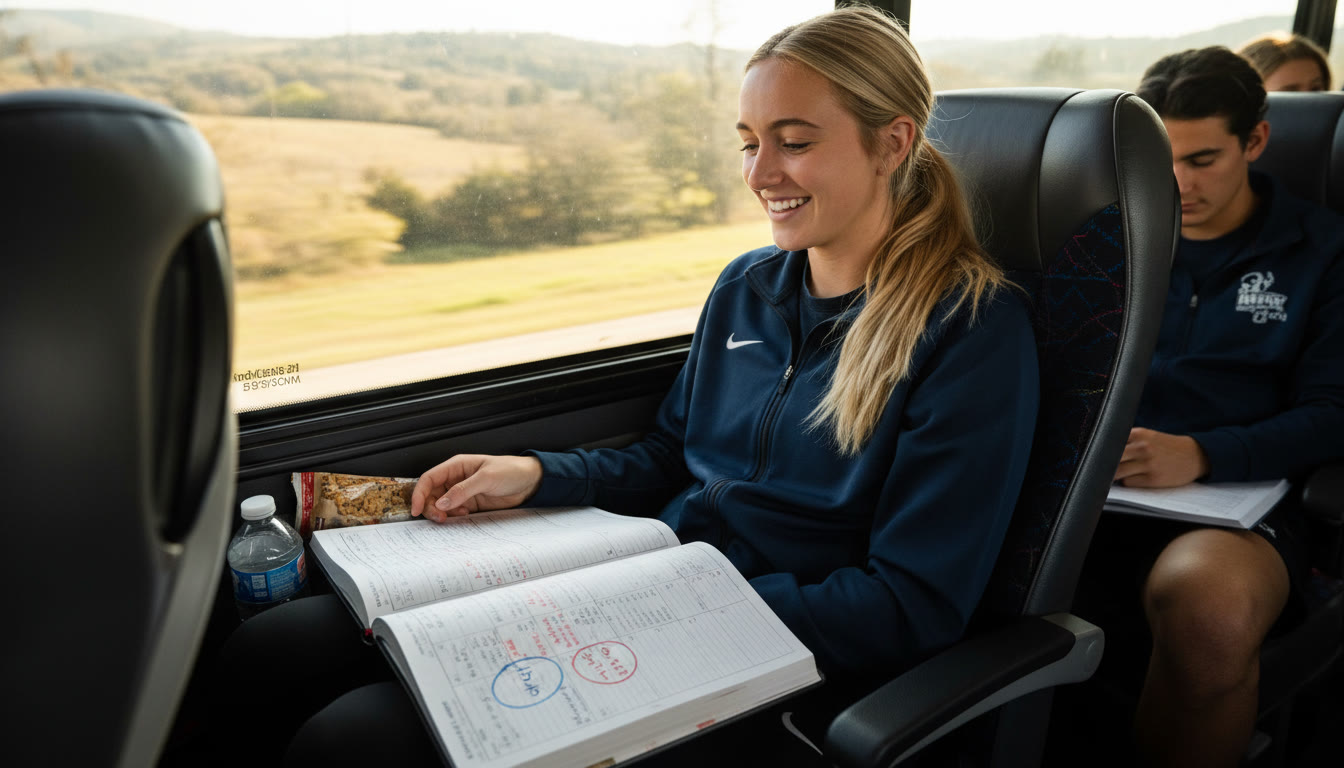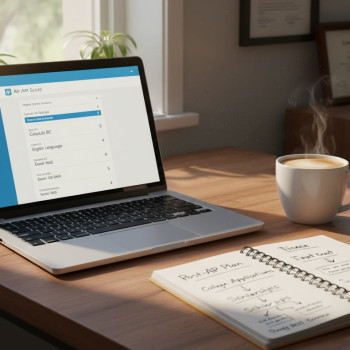Why This Matters: Sports Schedules and High-Stakes Tests
Being an NCAA athlete is a full-time commitment. Practices, travel, competition, recovery, and team obligations already fill your calendar. Add AP exams and the Digital SAT to the mix and the juggling act can feel impossible. But here s the good news: with realistic planning and the right information, you can protect your eligibility, strengthen your college applications, and still perform on the court, field, pool deck, or track.

Quick Overview: AP Exams and the Digital SAT in a Nutshell
Before diving into schedules, eligibility, and strategy, let s clarify what each test does for your college path.
AP Exams What they are and why colleges care
AP (Advanced Placement) courses allow high school students to take college-level coursework. At the end of the year, students can sit for an AP exam. Strong AP scores can earn college credit or advanced placement, and they signal to admissions committees that you pursued rigorous academics while managing a busy schedule something admissions readers notice in athletes.
Digital SAT a modern admissions standardized test
The Digital SAT is the College Board s computer-based version of the SAT. Many colleges use SAT scores as part of admissions decisions. For student-athletes, SAT scores can matter when coaches and admissions teams evaluate academic readiness and when NCAA academic eligibility and core-course verification come into play.
NCAA Eligibility Basics (Academic Side)
NCAA eligibility involves a mix of core-course requirements, GPA thresholds, and standardized-test benchmarks. While specific details can change and your academic counselor or compliance officer should be the final authority for your situation, there are several evergreen implications athletes should understand:
- Core Courses: The NCAA requires completion of certain core courses in high school. AP classes that match NCAA-approved core subjects can typically count toward those requirements. Make sure your AP course is listed with your school s counselor as an NCAA core course.
- GPA and Test Scores: Your core-course GPA and qualifying standardized-test scores are combined to determine initial eligibility. How AP grades affect GPA depends on your school s weighting system many high schools weight AP classes positively, which can boost your GPA if you perform well.
- Transcript Timing: Coaches and compliance staff often request early transcripts (mid-year or final-year) when recruiting. Good AP performance can showcase academic rigor and prepare you for the demands of college coursework.
Seasonal Constraints: Mapping Test Dates to a Training Calendar
The calendar is where many decisions get made. Practices don t pause for exams, and travel can conflict with scheduled test administrations. Here s a practical way to map AP and SAT dates onto a typical high-school athletic year.
AP Exam Season the May window
AP exams are administered in a concentrated window in May. For many seasons spring sports especially this period often overlaps directly with competition season. Winter and fall athletes may face fewer direct clashes, but preseason training or postseason tournaments can still complicate exam week.
Digital SAT Dates multiple options during the year
The Digital SAT is offered several times a year, both on weekend administrations and school-day administrations. This flexibility lets you pick tests during off-season periods or breaks. If you re a spring-sport athlete, plan an SAT during a fall or early winter window; if you re a fall-sport athlete, consider late winter or spring test dates that don t conflict with important competitions.
Concrete Scheduling Strategies for NCAA Athletes
These are practical, season-aware approaches you can adapt to your sport and level of competition.
1. Start with the season calendar
- Get your team s full-season schedule as early as possible practices, conditioning blocks, travel, and championship windows.
- Mark high-intensity periods (peak competition weeks) where mental and physical energy will be lower.
2. Work backward from AP exam dates
AP exams are fixed in early to mid-May (with established late-testing dates available for unavoidable conflicts). If you re on a spring team, you ll likely need to discuss accommodations or alternate testing options with your AP coordinator early in the year. Early communication with your AP coordinator is nonnegotiable.
3. Choose SAT dates that respect training cycles
Because the Digital SAT has multiple administrations, aim for test dates during offseason or lighter weeks. If you rely on school-day SAT administrations, make sure to get permission early and to confirm the date won t interfere with mandatory team activities.
4. Use late-testing and makeup options sparingly and wisely
AP late-testing exists for legitimate conflicts, but alternate exams may differ in format or timing. Use late-testing only when necessary and coordinate with your school to understand the implications for scoring and college reporting.
Checklist: Who to Talk To and When
Coordination is a team sport. Here are the people and offices you should loop in:
- Your high school AP coordinator for exam registration, late testing, and accommodations.
- Your school counselor to ensure AP courses count as NCAA core courses and to request early transcripts when needed.
- Your athletic coach to negotiate practice or travel adjustments for crucial test days and to document conflicts if necessary.
- Your college recruiter or compliance officer especially if you re in active recruitment, so they know when you ll be unavailable and understand your academic timeline.
How AP and SAT Performance Interact with Admissions and Scholarships
AP success and SAT scores both help your college profile, but they play different roles:
- AP Exams demonstrate subject mastery and can translate into college credit or placement valuable for athletes who might want more flexibility in their course loads in college.
- Strong SAT results can bolster your academic readiness in admissions files and sometimes factor into scholarship calculations or academic awards.
- Balancing AP and SAT efforts smartly can maximize both outcomes: use AP to deepen academic claims and SAT to show broad readiness.
Study Planning: Balancing Practice, Travel, and Prep
Training and exams both demand consistent, deliberate practice so the study habits you use for sport translate well to test prep.
Weekly Routine Example for a Busy Athlete
Below is a sample micro-plan for a student-athlete juggling two-a-day practices, travel, and academics:
| Time Slot | Activity | Purpose |
|---|---|---|
| 6:00 7:30 AM | Strength or rehab session | Physical readiness; clear head for focused study later |
| 3:30 5:30 PM | Practice | Team commitments |
| 7:00 8:15 PM | AP study / homework (alternate subjects each night) | Build content retention and complete performance tasks |
| 8:30 9:30 PM | SAT practice (short, focused e.g., one practice section) | Maintain test skills without burning out |
| Weekend blocks | Full-length SAT practice test or AP practice exam | Benchmark progress and sim test conditions |
Micro-Practice for High-Retention Gains
- Short, daily SAT drills (20 40 minutes) beat one long cram session.
- For AP exams, interleave subjects to prevent burnout mix a reading-based AP with a problem-solving AP in alternate sessions.
- Use travel days for passive prep: audio review, flashcards, or mental rehearsal of formulas and vocab.
When to Prioritize AP vs. SAT: Decision Rules
There s no one-size-fits-all answer your sport, recruiting timeline, and college list shape the choice. Use these rules of thumb:
- If you re already leaning toward a major that requires subject mastery (e.g., engineering, biology), prioritize AP courses and exams that demonstrate readiness in that subject.
- If you need a stronger standardized-test signal for admissions or scholarship thresholds, schedule a Digital SAT in an offseason month and target score gains with focused practice.
- If recruiting is active and coaches are asking for early transcripts, prioritize completing AP coursework and maintaining a solid GPA coaches like academic reliability.
Examples: Two Student-Athlete Profiles and Their Plans
Profile 1: Emma Spring Track Athlete, Wants a STEM Major
Emma s spring season peaks in May right during AP exams. She plans accordingly:
- AP Strategy: Take AP Calculus BC and AP Physics in junior year, but negotiate with her AP coordinator to sit a late-testing AP Physics if a postseason meet conflicts in May.
- SAT Strategy: Take the Digital SAT in October (offseason prep in late summer) and again in January if needed. Use weekly 30-minute math drills during in-season weeks.
- Support: Emma uses Sparkl s personalized tutoring for targeted Calculus problem sets and 1-on-1 SAT strategy sessions, keeping sessions short around travel weeks.
Profile 2: Marcus Fall Football Defensive Back, Recruiting Active
Marcus s recruiting cycle requires early transcripts and frequent travel:
- AP Strategy: Focus on AP U.S. History and AP English Language in junior year to show rigor; take exams in May but schedule extra in-school review sessions for peak weeks. If a championship falls on exam week, his school s AP coordinator will arrange late testing for the affected AP exam.
- SAT Strategy: Use a school-day Digital SAT in March or a weekend option in December to avoid conflict with August camps. Keep short SAT practice sessions after team film review.
- Support: Marcus leverages Sparkl s tailored study plans and AI-driven insights to zero in on high-impact practice topics during recruiting season.
Accommodations, Documentation, and Last-Minute Conflicts
If you have documented disabilities or need testing accommodations, both AP and the Digital SAT have established processes but they require time. Submit accommodation requests early, and coordinate with your school s Services for Students with Disabilities (SSD) office. For last-minute travel conflicts, keep documentation from coaches and school administrators handy to explain the conflict when requesting a late AP exam or alternate SAT dates.
How Personalized Tutoring Makes a Difference (Yes Sparkl Fits Here Naturally)
High-performing student-athletes benefit from coaching off the field as much as on it. That s where personalized tutors and targeted study plans shine:
- 1-on-1 Guidance: A tutor builds a study schedule that respects your training calendar and focuses on weak spots no wasted time on areas you ve already mastered.
- Tailored Study Plans: Tutors can design weekly micro-sessions, help with AP performance tasks, and run through SAT strategy for time management and question types.
- AI-Driven Insights: Smart platforms identify high-impact practice items so when you have one hour between practice and film review, you do the highest-value work possible.
For busy athletes, working with a service like Sparkl can be a realistic way to get custom help without adding logistics stress: short, focused sessions, flexible scheduling around travel, and progress tracking that your coach and counselor can understand.
Common Pitfalls and How to Avoid Them
- Waiting to schedule tests until conflicts are unavoidable book SATs and confirm AP logistics early in the school year.
- Overloading one season with both intense training and multiple AP exams spread AP coursework or use late-testing strategically.
- Not communicating coaches, counselors, and AP coordinators can t help if they don t know about your test dates and travel.
- Ignoring recovery your brain needs sleep and rest. Treat study like another training element and plan recovery weeks during peak competition periods.
Final Game Plan: A 6-Week Sprint Before APs or the SAT
If you have six weeks before a big test or AP exam, here s a simple sprint plan aligned with athletic life:
- Weeks 6 5: Diagnostic check. Take a short practice SAT section or one AP practice test to identify gaps.
- Weeks 4 3: Targeted skill blocks. Work 4 5 focused sessions per week (20 40 minutes each) on weak areas; keep one longer session (60 90 minutes) on the weekend.
- Week 2: Timed practice. Simulate test timing for one full section or an AP free-response set. Reduce physical intensity one day before.
- Week 1: Light review and sleep. Focus on quick refreshers, formula sheets, and relaxation techniques. Prioritize sleep and hydration before test day.
Wrap-Up: Balance, Communication, and Smart Support
AP exams and the Digital SAT don t have to derail athletic success. With advance planning, open communication, and focused practice, you can preserve your NCAA eligibility, strengthen your admissions profile, and still be at your best for games and meets. Remember these takeaways:
- Start with the season calendar and work backward from fixed test dates.
- Talk early and often with your AP coordinator, counselor, and coach.
- Use the flexibility of the Digital SAT and late AP testing when appropriate, but don t let them become last-minute crutches.
- Consider targeted tutoring short, personalized sessions (like those Sparkl offers) can be a high-leverage way to improve scores without overwhelming your schedule.
Being an athlete already gives you a head start: discipline, practice habits, and the ability to perform under pressure. Apply that same mindset to test prep, and you ll find the balance. If you’d like, I can draft a personalized six-week study plan tailored to your sport, season, and test dates tell me your season timeline and preferred test windows and we ll build it together.

















No Comments
Leave a comment Cancel